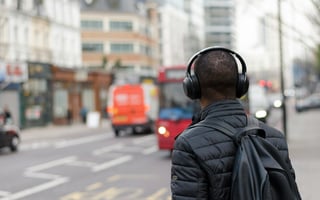Are radio interviews part of your comms and PR strategy?
One of Kamala Harris’s media interviews has caused a storm.
Not because of anything the Democratic nominee said.
But because she chose to appear on a podcast rather than traditional media.
Not got time to keep reading? Listen to the blog instead
The vice president opted to be interviewed on the popular Call Her Daddy podcast as the US election campaign enters its final month.
And the appearance came after she had faced criticism for keeping a relatively low media profile.
So, why podcasts, and what does it tell us about the evolving media landscape?
It is something that comes up a lot during our media training courses.
Although podcasts have slowed in their growth, and many media outlets struggle to monetise them, the format continues to boom.
According to a recent survey, 61 per cent of British people listen to podcasts every month,
The podcast Ms Harris appeared on is the second-largest one on Spotify, only trailing The Joe Rogan Experience, with an average of five million weekly listeners.
It is also ranked as the fourth biggest podcast across all platforms in America. Additionally, it has a significant social media presence – 3.9m people follow it on TikTok and it has 2.4m Instagram followers.
On the face of it, it may still seem an unlikely choice for an interview so close to the election,
As the host Alex Cooper admitted: “I don’t usually discuss politics”.
And critics have claimed it is a way of avoiding tough questions and combative journalists.
But, as already highlighted, Call Her Daddy is hugely popular.
The listeners are predominantly women, with many being Gen Z or Millennials – a key target audience.
It offers a way of reaching people who don’t rely on – or perhaps trust - traditional news sources.
And the more relaxed format can allow for a softer, relatable and more human side to emerge than is likely to happen through a traditional hard-hitting interview format.
It is not a one-off. Ms Harris also recently appeared on All the Smoke, a podcast hosted by two former basketball stars, in a bid to court younger voters. The podcast has more than one million YouTube subscribers.
As Rob Flaherty, her deputy campaign manager, said on X, “People have more content choices than ever” and the campaign needs to reach those who don’t naturally “consume political info”.
Baseline facts:
— Rob Flaherty (@Rob_Flaherty) October 7, 2024
-People have more content choices than ever
-If you consume political info, you want to consume political info
-Most of the remaining voters we need to talk to don't
That trad press don't get this sorta...speaks to the reason why this fact pattern exists!
It is a strategy shared by Donald Trump. In June, he appeared on the Impaulsive podcast, run by controversial YouTuber and wrestler Logan Paul. He has also been interviewed on Theo Von’s This Past Weekend and appeared on the Lex Fridman podcast.
He also did a livestream interview on X with Elon Musk, the platform’s owner. And he appeared on golfer Bryson DeChambeau’s Break 50 YouTube channel. None of these are traditional names on the pre-election media circuit.
Why does this matter?
Because it shows the media landscape continues to evolve.
Podcasts are not a flash in the pan.
They continue to grow and should be included in PR strategies, whether appearing on existing ones or creating one for your organisation.
They offer opportunities to reach new people. And explore subjects in more depth – the Kamala Harris Call Her Daddy interview was a 40-minute conversation.
According to Ofcom’s annual News Consumption report, 71 per cent of UK adults now get their news online. The ‘online’ category includes podcasts, social media, messaging apps and other websites/apps accessed through a device – and it is the biggest news source.
The News Agents podcast, presented by Emily Maitlis, Jon Sopel and Lewis Goodall, has now had more than 100 million downloads since launching in 2022.
One of the other great benefits of podcasts is how the content is repurposed for social media. Footage is clipped and used to reach huge social media audiences.
Call Her Daddy has 3.9 million followers on TikTok – and 17 per cent of adults in the US now get their news from TikTok, according to the Pew Research Centre. And it is growing in the UK as a news source, reaching 11 per cent of UK adults.
So, what makes a good podcast interview?
Conversation
During our media training courses, we stress the importance of spokespeople striking a conversational tone.
With podcast interviews, it is even more crucial. Even niche trade industry podcasts tend to have an informal, relaxed feel.
The key is for spokespeople to use everyday language. We want the language of the coffee shop – not the boardroom.
It also means treading carefully with notes. While it may feel reassuring to have them by your side, spokespeople can fall into the trap of reading them. And that will make them sound scripted and robotic.
Storytelling
Podcast interviews are unlikely to have the same time constraints as radio and television interviews.
Your spokesperson could be interviewed for around 60 minutes. Some podcasts are three hours plus and feature the guest throughout.
It creates a greater scope for getting messages across and sharing stories and anecdotes.
And stories help spokespeople bring messages to life, add credibility to proceedings and help them connect with the audience.
Personal
As well as stories, podcast interviewees must prepare to face personal questions.
The intimate nature of the format typically offers more opportunities to find out more about the spokesperson, as well as what they want to discuss.
So, while your spokesperson may want to talk about a new service or product, many questions could be about the person behind it.
Listeners want to discover more about the person who is in their ears.
Personal questions often appear innocuous but can be tricky for spokespeople.
And there have been plenty of examples of people tripping over them in different media formats.
So, podcast guests must consider these questions and plan how to respond. Think about questions like these:
- What is your biggest failure/mistake?
- What would you have wished you had known at the start of your career?
- What is the most common myth about your industry?
- What is the biggest challenge you have in your role right now?
Messages
When we cover radio interviews during our media training courses, we stress the importance of getting messages across early.
It is partly because of the format's time constraints. And also because the audience is likely to be multi-tasking.
People typically listen to the radio while doing something else - perhaps driving, working or cooking.
They dip in and out of what is said.
Podcasts are different. The audience often subscribes, is invested, and can listen when convenient.
Some people have specific podcasts for when they are working, going for a run or trying to get to sleep.
They can pause and stop as often as they like. Podcasts are also more likely to be listened to through headphones, raising the intimacy level.
It means the interviewee can be more relaxed about getting their message across and wait for more natural opportunities to use it.
Ask a few questions
We don’t tend to recommend spokespeople ask questions during most media formats.
But podcasts, as we have already said, are different.
The scope for longer interviews leads to more natural conversations - and conversations normally involve more than one person asking questions.
So, don’t be afraid, as a podcast guest, to ask the hosts a few questions.
Smile
One of our expert tutors says, “You can hear a smile on the radio”.
It sounds weird, but it helps to bring energy and enthusiasm into an interview.
The same applies to a podcast, where it can also help create warmth.
The audience will sense if you are talking with a frown.
It is also worth saying many podcasts now have a video element.
YouTube, YouTube Shorts, TikTok and Instagram Reels offer opportunities to reach huge new audiences.
Media First are media and communications training specialists with over 35 years of experience. We have a team of trainers, each with decades of experience working as journalists, presenters, communications coaches and media trainers.
Click here to find out more about our media training and podcast services.
Subscribe here to be among the first to receive our blogs.




